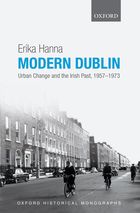 Erika Hanna
Erika Hanna
Oxford Historical Monographs
240 pages | 12 black and white images and 4 maps | 216x138mm
978-0-19-968045-0 | Hardback | 01 August 2013
- Examines civil society and activism to provide a new approach to the 1960s in the Republic of Ireland, moving away from previous emphasis upon economic reforms and high politics
- Uses urban politics to provide a new examination of social and cultural change in 1960s Ireland
- Provides a new interpretation of the cultural politics of Dublin’s eighteenth-century heritage
- Uses newly available archival sources
- Adopts new approaches from urban studies
During the 1960s, the physical landscape of Dublin changed more than at any time since the eighteenth century. In this period, the government began to invest in town planning, new opportunities arose for the country’s architects, and the old buildings of the core began to be replaced by modern structures. The early manifestations of this process were well received, understood as the first visible signs of prosperity and broader social and economic modernization. However, this attitude was short lived. By the end of the 1960s, popular support for urban change had evaporated; a disparate movement of preservationists, housing activists, students, and architects emerged to oppose urban change and campaign for the retention of the city’s heritage. The new buildings and urban forms had not brought the promised national rejuvenation. Instead, the rapid destruction of the extant city had come to be seen as symbolic of the corruption and failed promise of modernization.
<i>Modern Dublin</i> examines this story. Using approaches from urban studies and cultural geography, the author reveals Dublin as a place of complex exchange between a variety of interest groups with different visions for the built environment, and thus for society and the independent nation. In so doing, Erika Hanna adds to growing literatures on civil society, heritage, and cultural politics since independence, and provides a fresh approach to social and cultural change in 1960s Ireland.
Readership: Urban historians, historians specializing in modern Irish history, general readers interested in modern Irish history
http://ukcatalogue.oup.com/product/9780199680450.do#.Ui96lRaRC0s
Speak Your Mind
You must be logged in to post a comment.